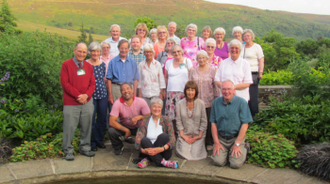Yorkshire: Christians Aware Summer School: Hope for the Planet?

Chrisians Aware Group at Parcevall Hall
'Hope for the Planet?' was the theme of the Christians Aware summer school 2016 held at Parcevall Hall in the Yorkshire Dales last week. Around 30 participants learnt about the decline in bees, the melting of Antarctica, the importance of organic agriculture for the environment and the challenges and hopes of rural ministry. They left at the end committed to promoting environmental justice back in their parishes and to tackling climate change through advocacy and lifestyle changes.
Speaker Richard Bushby, a Methodist preacher and a beekeeper, alerted the group to falling bee numbers due to poisoning by pesticides and habitat loss and the implications for our food crops. He warned about monocultures and the problem of bee hives being moved around for pollinating crops, which stresses the bees. The constant movement of at least a million bee hives in the US is thought to be one underlying cause of colony collapse there. The group was happy to learn that Parcevall Hall, which is run by the Church of England Diocese of Leeds, houses bee hives, and expressed willingness to look into campaigns to regulate the agrochemical industry.
Tim Bevan, the farm business manager of the Soil Association, was also concerned about diminishing plant life and the widespread use of pesticides- "there is virtually no biodiverse grasslands left and a big decline of birds in grasslands". He called for maintaining a varied environment in the countryside and greater appreciation of the role of earthworms and soil structure. Chemical companies such as Monsanto, which produces the Roundup pesticide, should be closely monitored. The Soil Association has repeatedly warned that Glyphosate--the active ingredient in Monsanto's Roundup--is a carcinogen that ends up in our food. Government figures show its use in UK farming has increased by a shocking 400% in the last 20 years. Nearly a third of UK cereal crops were sprayed with glyphosate in 2013. The Soil Association's 'Foods for Life' campaign certifies schools which grow food organically and encourage appreciation of food production.
Local environmentalist Peter Woods called for peat bogs to be retained and for better management of uplands. He called for reforestation of uplands and more teaching about trees in schools. He is involved in the Juniper Project which encourages the growing of Juniper, a species once widespread in Yorkshire. Local Bishop James Bell, who chairs the Church of England Rural Affairs Group, called for great lay responsibility for promoting the common good, including creation care.
"Antarctica - a thermometer of climate change" was a talk by Stuart Egginton who spoke of the changes he has seen there over seven visits. Antarctica is 9% of Earth's land mass and holds 70% of the world's fresh water. He felt the issue of melting ice in Antarctica is "a problem politicians should be taking more seriously than they do". Global warming could lead to flooding the world's coastal cities and the loss of diversity of life in Antractica. Egginton has seen glaciers reduce annually and witnessed penguins in increasing distress.
Alison Skinner of Global Justice Now and Ellen Teague of Columban JPIC spoke about the global picture of unsustainable growth and development which damages the poor and the environment. The work of Naomi Klein in suggesting that Climate Change "changes everything" was examined plus the 'Laudato Si' encyclical of Pope Francis where he calls for "ecological conversion". International campaigns on free trade deals such as TTIP and Divesting from Fossil Fuels were examined.
Many participants had worked for many years with Christian groups of various denominations in Zambia, South Africa and other countries in the global south and the conversation was full of interesting stories about mission outreach. In a resources room, stalls included Olive Oil and other products from the Zaytoun company, which markets Palestinian products, and products from the Philippines and Nepal.
Trips out to nearby Fountains Abbey and the ecumenical Scargill Movement at Kettlewell brought greater appreciation of the natural environment of the Yorkshire Dales. Scargill's walled garden was a treasure in its biodiversity and welcome presence of bees and other insects. The community is strong on environmental stewardship, recycling , composting and energy conservation in its 90 acre estate. We viewed their biomass boiler and learnt that 'Care for God's Creation'is part of their Christian mission.
Christians Aware is an educational and religious charity - under the leadership of Executive Secretary Barbara Butler - which outreaches beyond Christian networks. It works with other faiths and the secular world specifically on the promotion of Justice and Peace.


















